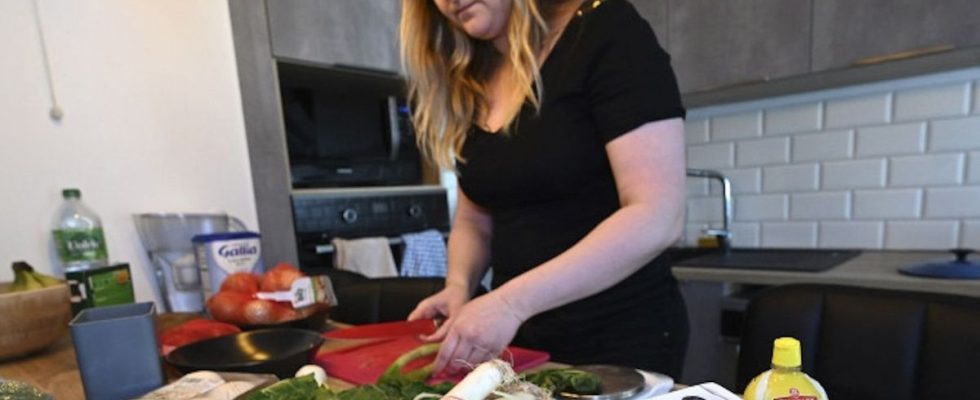Published on
Updated
Reading 3 mins.
Cooking all at once for the whole week in order to save time and money: this is “batch cooking”, a method that is gaining more and more followers in these times of inflation.
From the kitchen of her house, in a small Alsatian village 30 km north-west of Strasbourg, Sandra Thomann prepares all of her meals for the week in about two hours.
After cutting a brunoise of carrots and deseeding a pomegranate, she marinates the chicken in a soy and ginger sauce.
“I like recipes that are easy but change a little from the ordinary”describes the forties.
On the menu this week: chickpea salad, goat cheese / spinach pie, endive crumble and shrimp pasta. Little meat and fish, which allows these dishes to be kept longer.
They will be stored in the refrigerator, ready to be reheated and eaten throughout the week, following the “batch cooking” method (“cooking in batches”), which aims to anticipate what you will eat to better control your budget.
On Instagram, there are 115,000 to follow Sandra, alias “cuisineaddict”. Every Friday, she delivers her menus for the coming week, with the associated shopping list and the shelf life of the dishes.
Daily help
A popularity that “really exploded when I started sharing my batch cooking menus“, says the former executive assistant in an accounting firm.
A food blogger for almost 15 years, Sandra Thomann started in 2019 in this method already known across the Atlantic. In just three years, she has published a dozen books on “batch cooking”, with success, and today lives from her passion.
“In France, people like to cook,” she says, “And when we notice that it can help us on a daily basis, that it simplifies life and that it saves money, we stick to it. And more and more people are getting into it.”
Because many are looking for tips in this period of inflation which saw food prices jump 15.8% over one year in March.
“Lately, the big worry has been the rise in prices: how to continue to maintain a balanced diet without putting a strain on your budget”explains Sandra Thomann, who regularly exchanges with her subscribers on social networks.
Julie Sling, 29, is among them. She started “batch cooking” some time after the birth of her eight-month-old son Raphaël. The goal: to reduce his “mental load” and make his daily life easier.
NO to diets, YES to WW!
“The bare necessities”
“I tried and it turned out that it was much easier to eat a balanced diet and something other than frozen food which, in addition, can be expensive”, she testifies.
She no longer frequents the supermarket shelves and her shopping list is modeled on that proposed by Sandra.
“We really buy the bare necessities, we avoid buying things that will rot or that we risk not using”, she said, picking up her groceries at the drive-thru of a Strasbourg supermarket.
On the cash receipt side, the family’s monthly budget reaches a hundred euros per week, including purchases for the baby, including nappies and infant milk. “Before, we could be around 150 euros, we bought a lot of things because we never knew what we were going to prepare and in the end we bought too much“, she compares.
According to Sandra Thomann, “batch cooking” is the enemy of food waste but also of junk food: no more fast food and ready meals delivered to homes.
“When you’re tired, you come home late at night, you don’t want to cook after work, you just have to reheat the dish, it avoids cracking on expensive prepared meals”she points out.
If the blogger feared that “batch cooking” was only a “fashion effect”, she is pleased that there are always “new people who are discovering the method, who are looking for tips. I think it’s made to last”.
